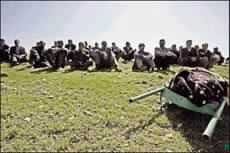- Author:
& Agencies - Section:
WORLD HEADLINES
Hope Fades for Children Buried by Turkish Quake

Rescuers continued to sift through the rubble of a school for the dozens of children still buried underneath, but hope faded of pulling any more out alive, two days after a violent earthquake hit this poverty-stricken region in eastern Turkey.
"We are hoping for a miracle" admitted Abdulmuttalik Celik on Saturday, exhausted after three days of searching for his 14-year-old brother Celik, trapped under the rubble of an earthquake-hit boarding school in the village of Celtiksuyu near Bingol, a town of 65,000 inhabitants.
The earthquake, measuring 6.4 on the Richter scale, hit the mainly Kurdish province of Bingol in the small hours of Thursday, killing nearly 140 people and injuring 520 others across the region, according to an official toll issued on Saturday morning.
Calm returned to the town of Bingol on Saturday after a protest over the official handling of the disaster boiled over into violent clashes between police and relatives of quake victims.
Nearly 200 children were asleep in their beds when their dormitory collapsed in the quake. At least 114 survived. But 64 bodies have been pulled from the wreckage of the four-storey building.
Bulldozers and heavy earth-moving equipment have moved in to sift through the wreckage, although rescuers have lost hope of finding more survivors among the 30 or so pupils still believed buried. Five more bodies were found overnight and another early on Saturday.
Angry parents and experts have blamed the death toll in the boarding school on poor building standards, and a probe had been launched against the company that built the school.
Disregard for building regulations and widespread fraud in Turkey's construction sector have long been blamed for thousands of casualties that the quake-prone country has suffered in recent years.
Violence erupted on Friday when several hundred people gathered in front of the governor's office in Bingol to ask for tents after spending the night outside as a precaution against aftershocks.
Tension boiled over after police drove a van deep into the centre of the crowd of protestors, who had disobeyed an order to disperse, with some of them trying to charge the governor's office.
In chaotic scenes, security forces fired dozens of rounds in the air with automatic rifles, while protestors hit back with sticks and stones and pounded police cars with iron bars.
The unrest, which underscored tensions between authorities and the region's mainly Kurdish population, resulted in the sacking of the city's police chief.
Prime Minister Recep Tayyip Erdogan and Governor Avni Cos both blamed the overnight clashes on provocation by elements of the old independentist PKK Kurdish rebels.
Relations between Bingol's Kurdish population and the security forces have been strained for years over an armed separatist rebellion in the region.
Bingol is one of the most impoverished provinces of eastern Anatolia. The majority Kurdish region has been devastated by the armed rebellion pusued by the outlawed Kurdistan Workers' Party (PKK) -- now known as KADEK -- between 1984 and 1999 in its struggle for self-rule in the region.
Erdogan said relief work was on track and called on the quake victims to show patience. Protestors, however, disagreed.
"The aid is not distributed equally. Relatives and acquaintances of parliament members receive more," said Fahrettin Demirel. "We were expecting understanding, but we were answered with bullets."
Saturday's Turkish press squarely blamed the violence on the poor handling of relief efforts.
"Rescue 10/10, Administration 0" headlined the Hurriyet daily, above a front-page shot of the street fighting in Bingol.
"Bullets as a get-well-soon message," wrote the Sabah daily. "Aid was not in short supply, but is was insufficiently or unfairly distributed," argued the newspaper.
Many of Bingol's inhabitants spent a third night out in the open in parks on Friday for fear of aftershocks. The lucky ones had tents, which they erected near their homes to prevent looting.
"My flat is not badly damaged but we are afraid to go inside," said Mehmet Sehrif, a construction worker, who has spent the past two nights in one of the 5,000 tents distributed by the authorities, who aim to have handed out at least 7,000 tents by the end of Saturday.
**PHOTO CAPTION***
Peasants wait for the digging of a grave near the dead body of 13-year-old Osman Artuk lying on the stretcher. Artuk died under the rubble of the demolished school of Buyuk Tekoren.(AFP/Mustafa Ozer)


 Home
Home Discover Islam
Discover Islam Quran Recitations
Quran Recitations Lectures
Lectures
 Fatwa
Fatwa Articles
Articles Fiqh
Fiqh E-Books
E-Books Boys & Girls
Boys & Girls  Women
Women









